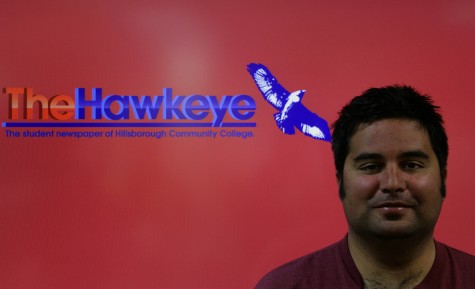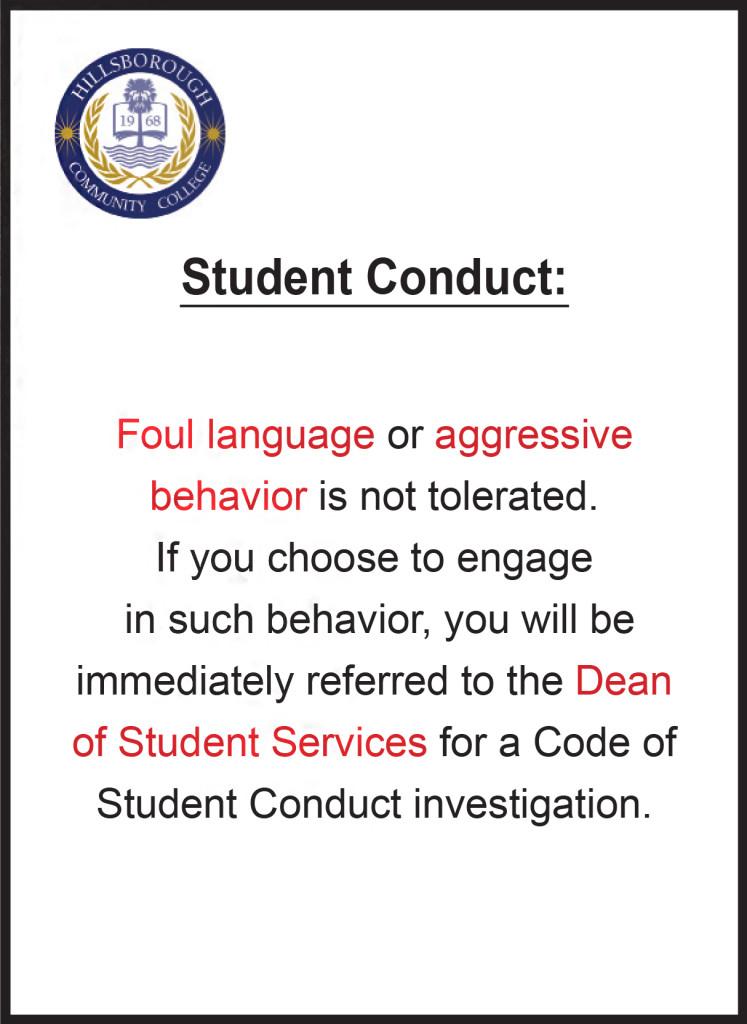No Cursing Policy for students at Brandon campus: college policy or a violation of Free speech?
(Student Commentary)
Rushing around the Brandon Campus on August 27, I realized I might be late for my interview with a recruiter at Workforce Brandon. I knew that Workforce worked with the college, so I mistakenly went to the Brandon Campus and entered the Career Center.
I am a student at the Ybor Campus, and this was my first time at the Brandon Campus. I came without any intention of causing a problem or to create a story.
Immediately upon entering the Career Center, I asked (by name) for my recruiter, and was told she did not work there.
I gave the address of Workforce, which I was told was by the campus. The career center staff member said she did not know where it was.
I called Workforce, and they told me that their office was in another part of Brandon. It was at least several minutes away.
My ride was already heading back to downtown Tampa and would be unable to pick me up for a couple hours. I was upset, but I composed myself.
I saw there was nothing left for me to do but wait for my ride, so as I got my things and as I left, I said under my breathe, “bulls–t”. (Saying to myself, it was “bulls–t” that I came all the way there for nothing.)
A woman who was working in the career center told me in a very stern tone, that if I was going to use that kind of language, she was going to call the dean. I told her that I was leaving, that I was a student, and that I wrote for the student paper.
She then went to the Dean of Student Services, Joe Bentrovato, and reported the “foul language”.
Bentrovato, as I was walking out of the Career Center, escorted me back into the Career Center, put me in a room, closed the door, and demanded my student ID.
I am not easily intimidated, so I refused to provide my student ID.
I began to walk out of the room. The dean then threatened to call security, stating, “If you do not give me your student ID, I will have security physically remove you from campus.”
I responded that I needed to use the facilities on campus until my ride arrived.
We then went to another office, and three security guards arrived. They made sure I complied with the ID request and the interrogation began.
Bentrovato took my student ID, and he photocopied it.
I was in shock with how I was being treated. He then went on to say, he was going to do me a favor by not making a report against me.
Really?
I was held for about 15 minutes, and I felt like a criminal being held by police; all for mumbling, “bulls–t”.
In my opinion, this is a violation of my constitutional right to Free speech and not something you would typically see on a college campus.
It also is a waste of security resources and the dean’s time. Perhaps this happened to me for a reason.
As I walked around the Brandon Campus, I started noticing warning signs all over the place.
The signs state:
“Foul language or aggressive behavior is not tolerated. If you choose to engage in such behavior, you will be immediately referred to the Dean of Student Services for a Code of Student Conduct investigation.”
I waited on campus (for my ride) for about 90 minutes. While I was waiting, I ran into a man that looked like he was of some authority. I asked if he was the campus president, and he said “Yes”.
It was Dr. Soto.
When I told him I had an incident that day that I wanted to see about reporting, he said he heard all about it. I then told him my side, and said that I felt intimidated.
Dr. Soto said it was good that I felt that way. I asked him to clarify, and he said that the rules are that students cannot use foul language, that if it happened to another 100 students first, would I have felt that way?
I felt he did not want to take me seriously. So, I walked away feeling humiliated.
I do not know what is behind the “foul language” policy on campus, but the administration definitely defends it. However, does that make it right?
I am not saying there are not times when a student needs to be reprimanded for using foul language, but this policy seems excessive, or radical, to say the least.
We must act professionally, but there have to be other ways to deal with foul language.
I don’t think Brandon campus students swear more than students on other campuses. However, I do think there needs to be better communication among students and staff. Many of the world’s problems could be solved with better communication or dialogue.

Alex Suarez is a Contributing Writer for The Hawkeye.
Alex Suarez was born in Boston in 1984. Suarez moved to Vermont in 1990. In 1995, Suarez published...


Rick • Jul 29, 2014 at 8:51 am
Please refer to paragraph 3 of the link below then click on obscenity.
HCC is in the right with their policy though I agree that their approach is a bit thugish.
http://www.law.cornell.edu/wex/first_amendment
Patti • Oct 18, 2013 at 4:06 pm
They violated your first amendment rights!
Mark • Oct 17, 2013 at 11:21 pm
Brandon, as a city, is pretty ass backward. This policy doesn’t shock me. All you can do is bring as much attention to it as possible.
Clark Pittman • Oct 6, 2013 at 12:48 am
Now that’s really something. Although I agree with the intent of the Brandon campus’ policy, it seems to be capricious and unenforceable. HCC is an academic institution, and as such requires of each participant an effort to be “above and beyond,” to strive towards betterment and advancement in ALL endeavors and activities. The foregoing not withstanding, the current popular culture is rife with profanities; even with the best of intentions an inappropriate word or phrase may slip out during some stressful occasion.
There seem to be several troubling aspects to HCC Brandon’s speech policy. The first is of definition: what, precisely, is meant by “foul language?” Is the vocabulary and speech of some of our required reading to be prohibited when uttering aloud? Is there a list of specific words and phrases that is prohibited? Is the policy in violation of the HCC Code of Student Conduct, Section IV (Violations), subsection D, paragraph 6: Intentionally interfering with the freedom of expression of others? Although there is no mention of any such policy or restriction mentioned in the Code of Student Conduct, there is a catch-all that may apply in Section IV-N-1: Violation of any published or posted College regulations not specifically mentioned…
The rules as such also state that students are required to provide their Student ID to certain College representatives (a Dean qualifies) or face possible disciplinary action. On the other hand, the HCC Bill of Student Rights states that students will not be suspended or expelled without a hearing on the allegations. I don’t know if being escorted off campus and prohibited from returning constitutes suspension, but it surely seems to be so in action if not in fact.
One other troubling aspect to the HCC Brandon policy is that of prohibiting “aggressive behavior.” Just what EXACTLY is “aggressive behavior?” Is protesting a parking ticket to the officer who is currently writing it up “aggressive behavior?” How about defending work on a student paper, believing that the professor either didn’t understand the meaning or was being unfair? If someone steals a cell phone and the owner fervently attempts to retrieve it, is that also “aggressive behavior?” It would seem that if a student (how about an instructor or administrator?) is to be reprimanded for uttering an undesired word, is one also to be so punished for defending oneself, for self defense is certainly aggressive behavior.
Has grade school zero-tolerance policy been enacted at HCC Brandon? Where’s my pacifier?!
For what it’s worth, I do think that your “BS” comment was inappropriate, for none of the staff present was responsible for your own admitted mistake. Where exactly was the BS if not in your own back pocket? It seems that there was an atmosphere of conflict involved with your encounter: you with your BS comment (directed at whom?) and the staff member with her immediate threat. You should have taken a better approach (“I can’t believe I’ve done this!”) and the staffer should have had a better approach as well (“Excuse me, but HCC Brandon doesn’t allow vulgarities here.”) Although the greater responsibility was on the staffer and the Dean, for the teaching of better behavior is a part of the higher-education process, the onus is still upon you to practice some self-restraint when in public.
Nevertheless, the HCC speech and behavior policy does seem, on the face of it, to be onerous and perhaps ultimately unenforceable.